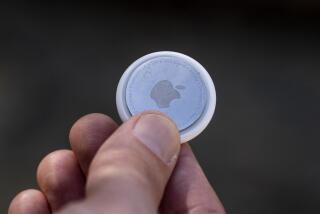The secret life of your cellphone
Concerned that mobile phone networks are becoming surveillance tools, the American Civil Liberties Union recently asked hundreds of local law enforcement agencies whether they’ve tracked people’s movements through their cellphones. Most of those that responded said they had, usually obtaining the information from mobile phone companies without a warrant. The practice has become so routine, the ACLU found, that phone companies are sending out catalogs of monitoring services with detailed price lists to police agencies. The alarming findings should persuade Congress to clarify that the government can’t follow someone electronically without showing probable cause and obtaining a warrant.
The Supreme Court has long held that the 4th Amendment guarantee against unreasonable searches and seizures requires police to obtain a warrant if the intrusion would violate a target’s “reasonable expectation of privacy.” That standard has barred law enforcement agents from surreptitiously recording what people say on the phone without a warrant, even when the conversation is taking place in a public phone booth. But the court and Congress set a significantly lower bar for monitoring other aspects of a phone’s use. The government can obtain records about numbers dialed and calls received — either from the past or live and in real time — with a subpoena, which a court will grant if shown that the records sought are relevant to an investigation.
Mobile phone networks collect another type of data that wire-line networks don’t: They register a phone’s location continuously as long as it’s turned on, even when it’s not in use. Those records can be exceptionally revealing; as the ACLU put it, the potential insights range “from which friends you’re seeing to where you go to the doctor to how often you go to church.” Nevertheless, the Justice Department and many local law enforcement agencies view location data as no different from calling records. With the acquiescence of mobile phone carriers, they’ve been quietly collecting this information through subpoenas, not warrants backed by a showing of probable cause. And in some cases, the subpoenas have been frighteningly broad; for example, one police department sought data on all the mobile phone users in the vicinity of a planned protest.
The fact that phone companies are collecting fees for providing this information raises the additional question of whether their financial interests trump their customers’ privacy interests. Looking for an answer, Rep. Edward J. Markey (D-Mass.), co-chairman of the Congressional Bipartisan Privacy Caucus, recently asked the major wireless carriers how much money they’ve collected from law enforcement agencies and whether they actively market their information-gathering services.
Location data can undoubtedly help solve crimes, but there’s a broader principle at stake. New technology enables people to trade information about themselves — sometimes consciously, sometimes not — for commercial benefits, convenience and insights into the world around them. They agree to share that information with service providers because of the unique benefits it brings — for example, users of the Roamz app can arrive in an unfamiliar town and see what previous visitors have said online about the best places to eat and stay. But if sharing this information automatically makes it the government’s for the asking, what will be left of the 4th Amendment?
A growing number of courts have been pushing back against the Justice Department’s permissive approach, but the rulings haven’t been uniform. Nor are there clear rules to distinguish emergencies from routine investigations, live tracking from the examination of stored data, or any of the many other complexities. Rather than trusting judges to sort it all out, Congress should make it clear that the protections that apply to phone conversations also apply to location data. No warrant, no tracking.
More to Read
A cure for the common opinion
Get thought-provoking perspectives with our weekly newsletter.
You may occasionally receive promotional content from the Los Angeles Times.






